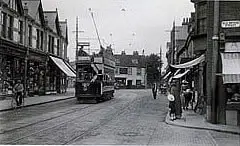To get on someone’s wick is to annoy them; get on their nerves.
Get on my wick
What's the meaning of the phrase 'Get on my wick'?
What's the origin of the phrase 'Get on my wick'?
The slang term ‘wick’ features in several variants of this phrase ‘you get on my wick’, ‘you’re getting on my wick’, we even find ‘he got on her wick’, although, as we will see below, the latter isn’t strictly anatomically correct. The expression is of UK origin but sounds a little dated now and was much more widely used in the mid 20th century.
‘Wick’ isn’t just slang, it is Cockney Rhyming Slang. For the source we have to visit the South West London district of Hampton Wick. The ‘Hampton Wick’ rhyme is with ‘prick’, which was later shortened to just ‘hampton’ or, less frequently, to ‘wick’. As with other words that are now considered acceptable in everyday speech, e.g. ‘berk’,and ‘cobblers’, ‘you are getting on my wick’ is often used without the speaker or hearer considering the genital origin.
That’s not surprising as many slang terms are euphemistic in the sense that they are attempts to smuggle innuendos past the uninitiated.
‘Hampton’ and ‘wick’ are right up there in this league. The best example of this is seen in the ongoing battle that Spike Milligan (the writer of the classic BBC comedy The Goon Show) and his writing colleagues had with the BBC censors. Following WWII, a crop of comedy writers returned from wartime service and the bawdy barrack room humour they brought with them was anathema to the rather stuffy establishment types who managed the BBC and who attempted to lay down the law on ‘unsuitable material’ in their infamous Green Book.
‘Wick’ as slang for ‘prick’, and the first use of the phrase in question, appears to have begun in the British services during WWII. The first reference that I can find to it in print comes from a military context, just at the end of the war – Penguin New Writing XXVI, 1945:
Parades and bulls*** get on his wick.
Private Milligan would certainly have been familiar with the sexual origin of the slang ‘wick’ and ‘hampton’ but the BBC censors, more likely to have been captains than corporals, apparently weren’t. In the Goon Show episode The Battle of Spion Kop, broadcast in 1958, he managed to introduce the character Captain Hugh Jampton (played by Michael Bentine, in a pretty good impersonation of the chinless wonder censors that they were satirising). The audience were up to speed with the innuendo and found Hugh Jampton (Huge Hampton, of course), and the fact that he was ‘excused shorts’, hilarious – at least I, as a nine year-old schoolboy, did.
The name of the district itself derives from ‘wick’, which has long held the meaning ‘dwelling place; town’. Many English place names derive this way, for example, the birthplace of my good self, Smethwick (probably as ‘place of the [black]smiths’).
Why rhymers chose the up-market Hampton Wick rather than Hackney Wick, a district much nearer to the Cockeys’ habitual East End stamping ground, isn’t clear.
Related phrases and meanings
Browse more Phrases
About the Author

Phrases & Meanings
A-Z
A B C D E F G H I J K L M N O P Q R S T UV W XYZ
Categories
American Animals Australian Bible Body Colour Conflict Death Devil Dogs Emotions Euphemism Family Fashion Food French Horses ‘Jack’ Luck Money Military Music Names Nature Nautical Numbers Politics Religion Shakespeare Stupidity Entertainment Weather Women Work
How did we do?
Have you spotted something that needs updated on this page? We review all feedback we receive to ensure that we provide the most accurate and up to date information on phrases.
